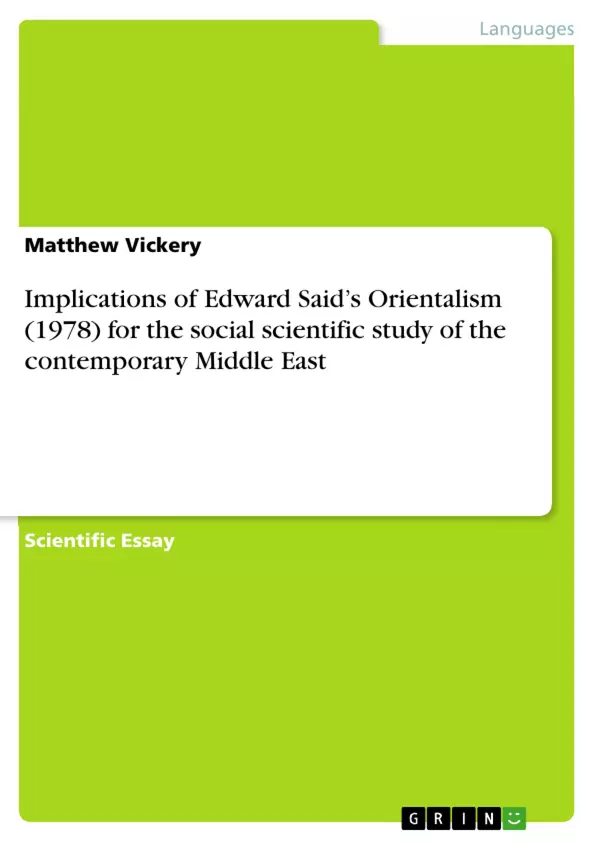Over thirty years since its publication, and ten since the death of its author Edward Said, Orientalism (1978) continues to have a profound effect on Middle East studies. Orientalism positioned Said as one of the founders and chief authorities in postcolonial criticism, opening the ‘floodgate[s] . . . that breached the authority of Western scholarship on Other societies’ (Prakash, 1995: 99); consequently work produced in the field since has often been in response to Said’s scholarship (Sullivan, Ismael,1991: 2). Discovering the true or underlying implications of Orientalism for the social scientific study of the Middle East will be the remit of this essay.
Inhaltsverzeichnis (Table of Contents)
- The Implications of Edward Said's Orientalism (1978) for the Social Scientific Study of the Contemporary Middle East
- The Implications of Said's Orientalism
- The Underlying Implications of Said's Orientalism
Zielsetzung und Themenschwerpunkte (Objectives and Key Themes)
This essay examines the implications of Edward Said's Orientalism (1978) for the social scientific study of the contemporary Middle East. It analyzes Said's theory and explores the implications of his argument for the study of the Middle East. The essay then delves into critiques of Said's work, revealing weaknesses and contradictions in his argument. By deconstructing and reconstructing Said's argument, the essay aims to determine the true and underlying implications of Orientalism for social scientists studying the Middle East.
- The concept of Orientalism as a discourse of power
- The influence of Orientalism on Western colonial enterprises
- The limitations of objective study of the Middle East from a Western perspective
- The role of social scientists in perpetuating or challenging Orientalist discourse
- The need for a critical and nuanced understanding of Orientalism in contemporary Middle East studies
Zusammenfassung der Kapitel (Chapter Summaries)
The first section of the essay provides a detailed explanation of Said's theory in Orientalism, highlighting the pervasive discourse that creates a binary opposition between the Orient and Occident. It explores how this discourse, informed by Michel Foucault's concept of discourse, is linked to Western colonialism and imperialism in the Middle East. The section concludes by arguing that, if taken as fact, Said's theory implies that the social scientific study of the Middle East from a Western perspective is fundamentally flawed.
The second section delves into critiques of Said's theory, analyzing weaknesses and contradictions within his argument. Through this critical examination, the essay identifies the underlying implications of Orientalism for the social scientific study of the Middle East. It argues that a more nuanced and accurate understanding of Orientalism can be achieved by removing flawed or questionable elements from Said's argument.
Schlüsselwörter (Keywords)
The key concepts and topics explored in this essay include Orientalism, Edward Said, discourse, colonialism, imperialism, Middle East studies, social science, objectivity, representation, power, critique, and deconstruction.
Frequently Asked Questions
What is Edward Said's main argument in 'Orientalism'?
Said argues that 'Orientalism' is a Western style for dominating, restructuring, and having authority over the Orient through a pervasive discourse of power.
How did Said's work influence Middle East studies?
It positioned Said as a founder of postcolonial criticism and forced scholars to respond to his critique of Western scholarship on non-Western societies.
What are the social scientific implications of 'Orientalism'?
The essay explores whether objective study of the Middle East is possible from a Western perspective or if it is inherently flawed by Orientalist discourse.
What critiques exist regarding Said's theory?
Critics highlight weaknesses and contradictions in Said's arguments, suggesting a need for a more nuanced understanding of cultural representation.
What is the role of power in Said's discourse?
Drawing on Foucault, Said links the production of knowledge about the Middle East directly to Western colonial and imperial power.
- Quote paper
- Matthew Vickery (Author), 2012, Implications of Edward Said’s Orientalism (1978) for the social scientific study of the contemporary Middle East, Munich, GRIN Verlag, https://www.grin.com/document/208957



